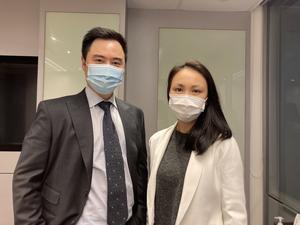 Alastair Mah Pui-wan (left), a former senior manager at the Hospital Authority's Patient Safety & Risk Management Department. Pamela Tin Sze-pui (right), head of Healthcare and Social Development of Our Hong Kong Foundation. (PHOTO PROVIDED TO CHINA DAILY)
Alastair Mah Pui-wan (left), a former senior manager at the Hospital Authority's Patient Safety & Risk Management Department. Pamela Tin Sze-pui (right), head of Healthcare and Social Development of Our Hong Kong Foundation. (PHOTO PROVIDED TO CHINA DAILY)
Two overseas-trained doctors have thrown their weight behind a Hong Kong government plan to waive a written qualification examination for medical professionals elsewhere to practice in the city.
The government announced the plan on Feb 4 in a bid to lure more non-locally trained doctors to relieve the strained healthcare system, especially in public hospitals, which take in 9 out of 10 patients, according to the Hospital Authority.
The HA currently manages 43 public hospitals and more than 120 specialist and general outpatient clinics, with facilities and services stretched to the limit amid the pandemic.
The world is moving toward specialization and Hong Kong’s healthcare system is restricting its own development by insisting that every doctor should be a general practitioner, which is an archaic requirement, said Alastair Mah Pui-wan, 41, a Hong Kong-born Australian doctor
For doctors to fully register in Hong Kong, they must pass a licensing examination held by the Medical Council of Hong Kong — a statutory body that handles the registration and disciplinary regulations.
Under the latest government proposal, medical professionals may be exempt from the rigorous examination as long as they work in a local public hospital for five years.
Local think tank Our Hong Kong Foundation has called for speedy passage of the proposal to care for the aging society. By 2036, those aged 65 or above will account for 29.9 percent of the city’s population, and another 10,000 doctors are needed to match the level of healthcare for chronic diseases 20 years ago, Pamela Tin Sze-pui, head of the think tank's Healthcare and Social Development, said in a report published in February.
Alastair Mah Pui-wan, 41, a Hong Kong-born Australian doctor, held an administrative post in the HA before he left in January. With about five years of clinical experience and eight years in an administrative role in Australia, he was responsible for patient safety and risk assessment at the HA.
ALSO READ: HK doctor cleared in massive securities fraud probe
He did not take the local licensing exam, which, he said, is a daunting task as it covers all medical subjects rather than just his specialized field.
The world is moving toward specialization and Hong Kong’s healthcare system is restricting its own development by insisting that every doctor should be a general practitioner, which is an archaic requirement, he said.
Mah said he would have considered taking up clinical practice in Hong Kong if the examination had not been in place. But at the moment, it’s not a worthy choice.
Mah, who’s now working at a private hospital in Beijing, said the real obstacle to providing quality medical services is the manpower shortage.
He cited a case in which a patient had to wait for seven years for a knee replacement surgery, as well as other “unacceptable” services for some patients, such as extremely brief medical consultations for cardiac diagnosis, and getting the wrong medicines due to lack of manpower.
Some local practitioners fear that scrapping the examination would lower medical standards and damage Hong Kong’s sound medical system.
But Mah rejected such criticisms, saying they’re only concerned with their own interests instead of those of patients. If they’re really worried about the quality of medical services, a flexible yearly assessment can be introduced to replace the one-time examination for doctors registered in the city, he suggested.
Shiu Wai-chung, a Hong Kong doctor trained in the United States and the United Kingdom who now practices in Australia, said medical practitioners could gain from their experience.
When he applied to practice in Australia, he was asked to join a tutorial program, in which an experienced “mentor” would brief non-locally trained doctors on how the local system works.
At the end of the program, there will be a clinical test covering some six elaborately designed cases to assess a doctor’s competence.
READ MORE: Demystifying the myths around doctor shortage
“Taking examinations is what we can do, but not what we prefer if we’ve other options. We prefer hands-on experience,” said Siu.


